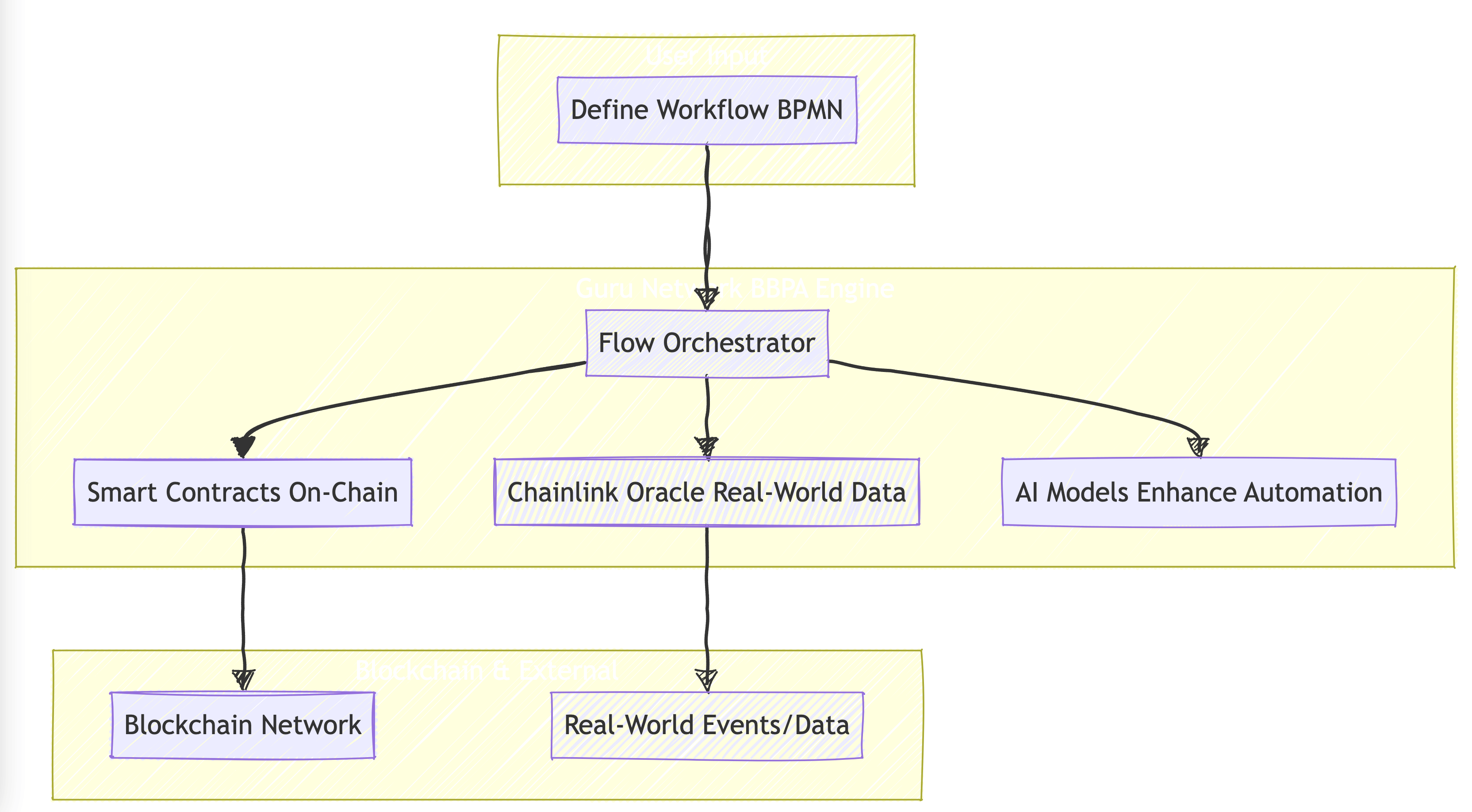The Missing Piece in Web3
BBPA engines, seamlessly orchestrating on-chain and off-chain processes, empower users to automate a wide array of tasks - from simple DeFi routines to complex business operations.

Why We Need BBPA Engines
The decentralized finance (DeFi) space has seen tremendous growth, but it's also become increasingly complex. The multitude of blockchains, decentralized exchanges (DEXs), and financial instruments can be overwhelming for users. Navigating this landscape often requires manual effort, technical expertise, and constant vigilance. The need for automation in DeFi is clear, and that's where Blockchain Business Process Automation (BBPA) engines come in.
BBPA engines offer a solution to the challenges of DeFi automation by providing a framework for orchestrating complex workflows across multiple blockchains and off-chain systems. They enable users to automate routine tasks, execute trades based on predefined conditions, and manage their DeFi portfolios more efficiently. By streamlining these processes, BBPA engines can save users time, reduce errors, and improve overall productivity.
Moreover, BBPA engines can enhance the security and transparency of DeFi operations. By automating processes and recording transactions on the blockchain, they minimize the risk of human error and fraud. The transparent nature of blockchain technology allows users to track and verify every step of the automated process, fostering trust and confidence in the DeFi ecosystem.
How BBPA Engines Work
The inner workings of BBPA engines hinge on the seamless integration of BPMN and Web3 technologies. The process starts with defining the desired workflow using the BPMN standard, which provides a visual representation of the sequence of tasks, decision points, and interactions involved. This BPMN definition is then deployed onto the Flow Orchestrator, the execution core of the Guru Network.
The Flow Orchestrator acts as a bridge between the BPMN definition and the Web3 world. It translates the BPMN tasks into executable actions, interacting with smart contracts, triggering on-chain transactions, and fetching real-world data. The engine also manages the state of the process, ensuring that tasks are executed in the correct order and that any errors or exceptions are handled gracefully.
To interact with the blockchain, BBPA engines leverage smart contracts deployed on the network. These contracts represent the on-chain counterpart of the BPMN definition, enabling the engine to initiate and monitor transactions, access data stored on the blockchain, and interact with other smart contracts. The use of smart contracts ensures that the automated processes are transparent, secure, and tamper-proof.
In addition to on-chain interactions, BBPA engines can also access real-world data through Chainlink's decentralized oracle network. This allows them to incorporate external information into their decision-making processes, enabling more sophisticated and dynamic automation scenarios. For example, an engine could trigger a trade based on the price of an asset fetched from a Chainlink oracle, or it could execute a smart contract based on the outcome of a real-world event.
Finally, BBPA engines can leverage AI models to enhance their automation capabilities. These models can be used for tasks such as data analysis, prediction, and decision-making, allowing the engine to adapt to changing conditions and optimize its performance. The integration of AI enables BBPA engines to handle more complex and nuanced automation scenarios, further expanding their potential applications.

Diagram Explanation
- User Input: The process starts with the user defining the desired workflow using the BPMN standard. This creates a visual representation of the automation process.
- Flow Orchestrator (Core Engine): The BPMN definition is deployed onto the Flow Orchestrator, which acts as the brain of the BBPA engine. It:
- Translates BPMN: Interprets the BPMN steps into actionable tasks.
- Interacts with On-Chain: Executes smart contracts on the blockchain to perform actions and access data.
- Fetches Real-World Data: Connects to Chainlink's decentralized oracle network to retrieve external information.
- Utilizes AI: Leverages AI models for advanced decision-making and optimization.
- Manages State: Tracks the progress of the workflow and ensures everything runs smoothly.
- Smart Contracts (On-Chain): These are pre-programmed contracts on the blockchain that carry out specific actions when triggered by the Flow Orchestrator. They ensure transparency and security in the automation process.
- Chainlink Oracle (Real-World Data): Chainlink oracles provide a secure way to connect the blockchain with external data sources, allowing the BBPA engine to make decisions based on real-world events or information.
- AI Models (Enhance Automation): AI models add a layer of intelligence, enabling the engine to analyze data, make predictions, and optimize its actions for better results.
- Blockchain Network & External Events: The blockchain serves as the foundation for secure and transparent execution of smart contracts. External events or data, accessed through Chainlink oracles, can trigger or influence the actions of the BBPA engine.
What BBPA Engines Enable
The true power of BBPA engines lies in their ability to reshape the Web3 landscape, opening doors to a new era of possibilities. By seamlessly orchestrating on-chain and off-chain processes, these engines empower users to automate a wide array of tasks, from simple DeFi routines to complex business operations.
In the realm of decentralized finance (DeFi), BBPA engines can revolutionize how users interact with the ecosystem. Imagine setting up automated trading strategies that execute trades based on real-time market data and predefined conditions, eliminating the need for constant monitoring and manual intervention. Or picture effortlessly managing your DeFi portfolio across multiple chains, rebalancing assets, and optimizing yields with just a few clicks. BBPA engines make these scenarios a reality, empowering users to take control of their DeFi journey.
Beyond DeFi, BBPA engines have the potential to transform various industries. In supply chain management, they can enable real-time tracking and verification of goods, ensuring transparency and authenticity at every step. In the realm of customer service, BBPA engines can automate personalized interactions, providing tailored recommendations and support based on individual preferences and behavior. The applications are limitless, and as the technology matures, we can expect to see even more innovative and impactful use cases emerge.
In essence, BBPA engines are the catalysts that will drive the mass adoption of Web3. By simplifying complex processes, enhancing security, and unlocking new possibilities, they pave the way for a more accessible, efficient, and user-friendly decentralized future.
